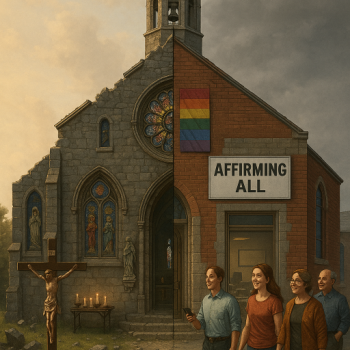In the first entry of this series, Eric Luppold and I made our cases on the role of authority in the Christian life, one from a Protestant perspective, the other a Catholic. We then responded to each other’s case in a follow-up entry. This entry narrows down the focus to key points of disagreement. For my part, I answer direct questions and observations put to me by Eric.
The Church
In this debate, Dennis seems to use the word ‘church’ to refer to the Roman Catholic Church as it is currently structured. This is a something that I disagree with, and I would argue that the definition of the church must be defined by Scripture, not by imposing the modern structure onto the ancient text.
Correction: for the debate, I use the word Church to refer to the visible historical institution Jesus established. This Church existed at the time of St. Peter and the apostles and still exists today. I never claimed the Church at the time of St. Peter looks identical to the one that exists today. To use the analogy of the acorn and tree: an acorn looks different than a fully grown tree, yet the tree and the acorn remain the same. The difference between them concerns stages of development. Furthermore, as a fully grown 51-year-old man, I look quite different than I did as a zygote, yet the 51-year-old me and the zygote me are the same person.
Moreover, Eric’s comment regarding Scripture defining the Church merely adds one more layer to our current debate, as he now gets to define Church because he is the interpreter of Scripture. My definition concerns an historical institution, not my own interpretation of Scripture.
The Authority of an Arian Council
If we give councils preeminence over Scripture, we end up in a conundrum. For example, the Council of Ariminum in 359 AD was attended by over 400 bishops and adopted the Arian position. Why was that council invalid? Dennis might argue that the church does not recognize that council as ecumenical. But he has the luxury of looking back on history. How could a Christian living in 360 AD know that the Council of Ariminum was wrong? And, when the next council met in 362 AD., what standard did they use to overturn the previous council? God’s revealed word.
Sadly, if the Church lacks the final authority to define doctrine, those who twist Scripture, even in groups (like the “council of Arimimum”), may also lead others down their own twisted path to destruction. For the record, Ariminum took place in Italy and the only local council that took place in 362 occurred in Alexandria, Egypt. In fact, Pope Liberius decreed Ariminum lacked authority, not a council. I could not find any evidence that the council of Alexandria used Scripture alone to overturn any previous Arian “council.”
Who Determines Conformity?
Now, while Scripture is the final authority, councils, creeds, and confessions do have authority insofar as they rightly conform to Scripture.
In the above statement, Eric affirms a main point I made in my opening statement. I observed that, for Protestants, councils only possess authority insofar as they agree with the Protestant’s understanding of Scripture, as they judge for themselves if the council “conforms to Scripture.” I again restate: each individual believer (who can read) possesses the authority of God (via the Bible) to correct (reform) the Church and hold the Church accountable to their own personal interpretations. They, not the Church, decide the criterion for what counts as conformity.
Man’s Words Vs. God’s Words
For the Protestant, God’s word is at the top. For the Catholic, man’s word (the word of the Magisterium) is at the top. In this way, Catholics have traded divine truth for man-made certainty.
For the Protestant, what counts as “divine truth,” if all truths contained in Scripture must first filter through each individual Protestant? Catholics hold that God stands at the top. In turn, God reveals Himself through both written and spoken words. The Church’s role, via the Holy Spirit, concerns cherishing these words, reflecting on them, and carrying them to the ends of the earth. These words, as they travel through time, require clarification as they encounter new cultures and new ideas, especially dangerous ones which threaten Church unity and the salvation of souls. The role of clarification, and ultimately definition, falls to the Magisterium (the bishops and the pope).
However, every instance of a Protestant interpreting Scripture ultimately ends with one man’s word against another. All Protestants possess are man’s words.
Who Corrects the Correctors?
But even Dennis’s position does not solve the problem of certainty. For how does he know if the Magisterium got it right? What decision-making process did it use and how could he ever discern whether it made a mistake?
How do I “know if the Magisterium got it right?” May I also appeal to the Holy Spirit? Might I then appeal to history? The fact that the Church has continuously defined doctrines and dogmas; while also spreading the Gospel the end of the earth, proves her right. Also, my role is to submit and assent to the Church, not to dictate to her.
Boundaries and Definitions
God’s word sets the boundaries and defines terms.
The standard of discerning a tyrant from a legitimate authority is God’s word. God is the one who grants authority. If that authority is being wielded as God instructs, then it is legitimate. If not, it is tyrannical.
Finally, if each individual Christian thinks they wield God’s Word as God instructs, they set the boundaries and definitions by which they then legitimately judge. If readers perceive a circle here, you were paying attention. Protestants, in their circular appeal to Scripture alone, replace one supposed “tyrant” with millions of competing tyrannies and chaos. To quote Iron Man in Marvel’s Avengers, “not a good plan.”
Thank you!
Read The Latin Right’s other writing here.
Please visit my Facebook page and IM your questions (and follow my page) or topics for articles you would like covered.
Also, please subscribe my YouTube page for updates on upcoming articles.













